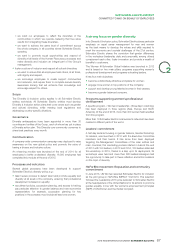APC 2015 Annual Report Download - page 94
Download and view the complete annual report
Please find page 94 of the 2015 APC annual report below. You can navigate through the pages in the report by either clicking on the pages listed below, or by using the keyword search tool below to find specific information within the annual report.
2015 REGISTRATION DOCUMENT SCHNEIDER ELECTRIC92
SUSTAINABLE DEVELOPMENT
2COMMITTED TO AND ON BEHALF OFEMPLOYEES
Social dialog in Mexico
In Mexico, Schneider Electric leaders conduct regular
communication with employees on topics related to their jobs:
this communication takes place in different ways, including large
communication meetings and small group conversations. There
is also continuous communication with the Union leaders and
delegates of four national Unions which represent unionized
employees. Schneider Electric keeps them informed of internal and
external issues impacting the company’s results, listens to their
concerns and looks for alignment with the company strategy and
challenges. Schneider Electric and the Unions review the collective
contract every year.
In 2015, Schneider Electric Mexico was certifi ed by CEMEFI as
a « Socially Responsible Company ». The mission of CEMEFI
is to foster and enhance the culture of philanthropy and social
responsibility in Mexico and strengthen the organized and active
participation of society in solving community problems. Different
topics are evaluated during the certifi cation process, including
active labor relations points.
Moreover , we were audited for compliance with the EICC Code,
confi rming our compliance on social, environmental and ethical
standards, including the Universal Declaration of Human Rights, ILO
International Labor Standards, OECD Guidelines for Multinational
Enterprises, ISO and SA standards and many more.
This certifi cation confi rms previous awards that had been granted
in previous years to Schneider Electric Mexico in relation to social
responsibility, diversity and family policy .
Social dialog in China
The Group has 39entities and over 100sites in China. Unions are
set up in 23 of them. Unions give input in the review of local policy
relating to employees’ remuneration. Unions also take a key role in
leading employee events and activities. The Group has discussed
the terms of a collective contract with Unions for several plants.
Four entities have already signed the collective contract.
Social dialog in India
Schneider Electric India has a strong social dialog culture with
both unionized and non-unionized employees. In 2015, Schneider
Electric India maintained cordial Industrial relations throughout its
factories.
This harmony has been achieved through a time-tested collective
bargaining process involving Unions or Workers Representative
Committees. In some of the units where there are no recognized
unions, this bargaining process is conducted with elected
employees on c ommittees such as Welfare (Works Committee),
Health & Safety, Canteen, Sports and Transport, etc., including a
special committee for women employees (fully compliant with the
prevention of sexual harassment as per local laws), duly represented
by external women with specialist knowledge of the subject and
with legal background . These committees provide a platform for
employees to represent their concerns, collective grievances
and workplace related issues to the management. All employee
engagement programs are run through these committees with the
active participation of every employee.
The process of social dialog also includes employee communication
in small groups as well as through Town Hall communication on
Company performance, strategy and challenges.
Child Labor & Human Rights
Schneider Electric commits in its « Principles of Responsibility»
to complying with local laws in every country where it operates.
Updated in 2013, this common reference shared with all Schneider
Electric’s employees worldwide relies on the 10 principles of the
Global Compact, the Guiding Principles of the Organization for
Economic Cooperation and Development, the Universal Declaration
of Human Rights and the International Labor Standards.
Regarding Child Labor & Human Rights in particular, Schneider
Electric’s Principles of Responsibility mention explicitly the fi rst,
second and fi fth principle of the Global Compact, which respectively
provide that «Businesses should support and respect the protection
of internationally proclaimed human rights, m ake sure that they are
not complicit in human rights abuses» and that businesses should
uphold «the effective abolition of child labor.»
The application of these principles is ensured by a management
system including the worldwide deployment of a training module
that all employees must undergo on an ethical alert process to report
and prevent any breach. At country level, each c ountry President is
accountable for Schneider Electric’s compliance with the country’s
regulations and must ensure a follow-up of any changes in these
regulations to maintain compliance.
In its purchasing strategy, Schneider Electric has defi ned «off-limit
situations» at suppliers ; child labor is one of them. These situations
are unacceptable for a Schneider Electric supplier. Processes and
training are being deployed among the purchasing function to learn
how to detect these situations and react when facing an ethical
dilemma.
























